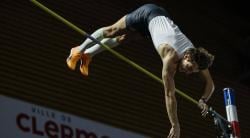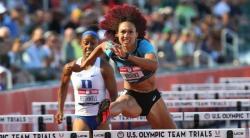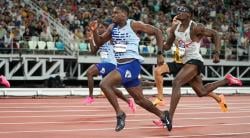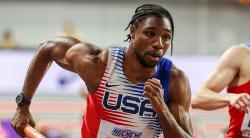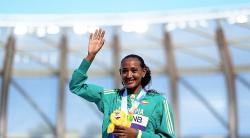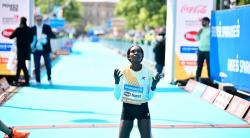Ryan Crouser narrowly misses shot put world record
Report athletics day 7 Tokyo 2020 Olympic games:
Ryan Crouser successfully defended his Olympic title with the greatest series in the shot put history. Crouser improved his own Olympic record in each of his six throws. The top-three finishers were the same as five years ago in Rio de Janeiro.
He started the final with 22.83m and improved to 22.93m in the second round. After producing three more throws over the 22m barrier (22.86m, 22.74m and 22.56m) Crouser produced a new Olympic record of 23.30m, missing his own world record by just seven cm.
Crouser dedicated his win to his late grandfather Larry, who passed away the week before his grandson left for Tokyo.
Ryan Crouser: “He got me started throwing and I threw in his yard until eighth grade. He played a huge role in my throwing circle. So to lose him the week before coming to the Olympics obviously was sad. I feel like he was able to be here in spirit. I sat with him for a few hours after the Trials and was able to tell him I was the world record holder. He watched that throw on the iPad thousands and thousands of times”.
Reigning world champion Joe Kovacs won the silver medal with 22.65m in the fourth round in a repeat of the Olympic Games in Rio de Janeiro in 2016. Tom Walsh from New Zealand claimed the bronze medal with 22.47m. New Zealand won the second bronze medal in this discipline at this year’s edition of the Olympic Games after the third place achieved by Valerie Adams.
Joe Kovacks: “I am really happy coming back with a silver and Ryan coming back with a gold. That’s our job as US shot putters. We are the best country in the world at throwing, so we have got to make sure we don’t come back empty-handed”.
Darlan Romani from Brazil finished fourth with 21.88m, ending up outside the podium after finishing fifth at the Olympic Games in Rio de Janeiro 2016 and fourth at the World Championships in Doha 2019. Zane Weir from Italy, who trains with Leonardo Fabbri under the guidance of former shot putter Paolo Dal Soglio, finished fifth with his lifetime best of 21.41m.
It was the deepest shot put final in Olympic Games history. All three medallists threw beyond the 22 metres barrier. The top six finishers threw over the 21m barrier and the top nine produced throws over 20.70m.
Women’s heptathlon:
Nafissatou Thiam from Belgium won the gold medal with a world leading mark of 6791 points becoming the second woman in history to successfully defend an Olympic combined events title after Jackie Joyner Kersee. Anouk Vetter from the Netherlands claimed the silver medal breaking her own national record with 6689 points. Vetter’s compatriot Emma Oosterwegel improved her lifetime best by more than 300 points to her PB of 6590 points.
Nafissatou Thiam: “I still cannot believe it. I am just so happy. I don’t know what to say. The first day was difficult for me, but I started day two really focused. I knew I needed to do something really good in the long jump and javelin. I was hoping to do a little better in the 800m, but overall I am really happy. What counts the most is the gold medal, and I got it”
Thiam opened with a solid 13.54 in the 100m hurdles before clearing 1.92m in the high jump. Vetter and Oosterwegel both cleared 1.80m. Katarina Johnson Thompson cleared a seasonal best of 1.86m to move into the third place.
Thiam threw 14.88m in the shot put to keep her lead. Vetter moved up to second place. Noor Vidts produced a best release of 14.33m to move into third in the overall standing.
Johnson Thompson threw 13.31m (the second best mark of her career) in the shot put.
Vetter clocked 23.81 in the 200m to move into the overall lead at the end of the first day, with a gap of 27 points over Vidts, who ran 23.70. Thiam ran 24.90 and dropped to third just 27 points behind Vetter. Osterwegel ended the first day back in 11th place.
At the start of the second day Thiam leapt to 6.60m to move into second place. Vetter jumped 6.47m to defend her lead by just four points. Oostervegel moved uo to eighth after 6.29m.
Thiam threw the javelin to 54.68m in her second round to regain the overall lead. Oosterwegel and Vetter performed very well with 54.60m and 51.20m. Kendell Williams moved into third in the overall standing with her 48.76m throw. Vidts dropped down to fifth after her 41.80m effort.
Thiam built a 64-point gap over Vetter before the 800m. The Belgian star crossed the finish line in 2:15.98 to score 6791 points. Vetter clocked 2:18.72 to take silver 6689 points.
Vidts ran the two-lap event in 2:09.05, but Oosterwegel set her PB of this competition to move into third place with 6590 points. Vidts finished fourth with her PB of 6571 points ahead of Williams (6508), US Trials champion Annie Kunz (6420) and Carolin Schaefer (6419).
Decathlon:
Damian Warner won his first Olympic gold medal in the decathlon becoming the fourth combined events specialist in history to break the 9000 points.
Warner equalled his decathlon world best of 10.12 in the 100m and narrowly missed the long jump world best in a decathlon competition by just four cm with 8.24m. This jump would have earned him the bronze medal in the individual event.
The Canadian star set an Olympic decathlon best in the 110m hurdles with 13.46 and threw the discus to 48.67m, cleared 4.90m in the pole vault and threw the javelin to 63.44m. He led the field by more than 300 points before the final 1500m. He clocked 4:31.08 to set the world leading mark of 9018 points. Kevin Mayer from France won his second consecutive Olympic silver medal with 8726 points beating world under 20 bronze medallist Ashleigh Moloney, who claimed bronze with 8649 points. Moloney was second after eight events, but Mayer overtook the young Australian decathlete with a huge throw of 73.09m in the javelin, 15 metres further than Moloney’s best throw.
Warner won the bronze medal five years ago behind Ashton Eaton and Kevin Mayer.
Damian Warner: “It’s crazy. Ever since I was kid watching track and field on TV with my mother, I have wanted to be an athlete. In grade six I wrote a project, saying I wanted to be at the Olympics one day. Who knew I would go on to be an Olympic champion ? I used the experience of 2016 to propel me to this performance”.
Men’s 400 metres:
Steven Gardiner followed up his world title with the Olympic gold medal in the 400m in 43.85. Gardiner has become the first athlete from the Bahamas to win an individual gold medal in any sport.
Steven Gardiner: “At my first Olympics in 2016 I did not make the final but I think here in Tokyo I did what needed to be done. It ‘s unreal.I don’t think I will sleep tonight. I am cherishing this moment. When the gun went off, I stumbled a bit coming out, but I recovered. I kept it moving, and with 200m to go, I started to push a little bit. With 100m to go, I gave it all. I saw everybody coming up of the corner of the eye, but I saw: ‘It’s now or never. I just held on, I came across the line and saw my name on the big screen and I was in first place”.
Gardiner beat Colombia’s Anthony José Zambrano, who won the silver medal in 44.08 to become the first Colombian male athlete to win an Olympic athletics medal. Kirani James from Grenada claimed bronze in 44.13 completing a full set of medals after the gold in London 2012 and silver in Rio de Janeiro 2016.
Anthony Zambrano: “I want to show to the world that Colombia belongs to the global stage. I dedicate this medal to my mother on her birthday”.
Women’s pole vault:
World leader and this year’s US Trials Kate Nageotte missed the opening height twice at 4.50 but she held her nerve to win the Olympic gold medal at 4.90m. Reigning world outdoor champion Anzhelika Sidorova took silver medal with 4.85m to beat British record holder Holly Bradshaw on countback. Katerina Stefanidi finished fourth with 4.80m.
Kate Nageotte: “It was the worst warm-up I have had in a long time and I had an ugly first few jumps. It took me a few heights to get into it, but I was just fighting and I finally found a smooth jump. It came together. It has not even begun to sink in yet. We all have been through with Covid and everything. This is the biggest dream I have ever had for myself, and here I am, living my dream”.
Nageotte, Sidorova and Bradshaw all creared 4.85m at the first attempt. Sidorova and Bradshaw had two misses at 4.90m, but Nageotte cleared this height at the second attempt to take the lead. Sidorova passed her final attempt and made an attempt at 4.95m to take a lead over Nageotte. A miss at this height sealed the win for Nageotte, who burst into tears and hug his coach Brad Walker.
Sidorova won her fourth global medal after claiming the world outdoor gold in 2019 and the world indoor silvers in 2014 and 2018.
Pichardo breaks the Portuguese record with 17.98
Pedro Pablo Pichardo won the gold medal in the men’s triple jump with a Portuguese record of 17.98m, setting the second-best winning jump in Olympic history. Pichardo recorded the three longest jumps of the competition.
The Portuguese jumper of Cuban origin started the competition with 17.61m and repeated the same result in the second round. He bounded out to 17.98m in the third round.
Pedro Pablo Pichardo: “It was olways one of my dreams to win the Olympic gold medal. This is what I have been doing since I was six years ago. I feel a huge sense of happiness and i still have plenty of dreams ahead of me”
Fabrice Hugues Zango moved into second place with 17.47m in the third round ahead of double Olympic silver medallist Will Claye (17.44m). China’s Zu Yaming set a lifetime best of 17.57m to overtake Zango in second place. Zango and Claye produced jumps of 17.43m and 17.36m, but it was not enough to reach the podium.
Men’s 110m hurdles Final:
Jamaica’s Hansle Parchment took an upset win over pre-event favourite Grant Holloway in the men’s 110m hurdles final. Holloway had a big margin until the last two hurdles, but Parchment came through to win the gold medal in 13.04. Holloway had to settle with silver medal in 13.09 edging Jamaica’s Ronald Levy, who finished third with 13.10.
Hansle Parchment: “It’s the greatest feeling. I have worked so hard. It’s unbelievable that I caught Holloway. I am really grateful. A lot of times, after the final hurdle, I am leaning too early, and my coach reminded to run through the line. That’s what I did”.
Holloway had not lost a sprint hurdles race since August 2020.
Grant Holloway: “I just think the nerves, the big atmosphere got the best of me a little bit, but I am young. I have got a lot of races under my belt, so I will take this with a grain of salt and I keep moving forward. This was not the outcome that I wanted but it enables me to say: ‘I am an Olympic medallist. I love the hurdles and I can’t wait until next year for the World Championships in front of a home crowd in Eugene”.
Men’s 20 km walking race:
Italy’s Massimo Stano held off Japanese walkers Koki Ikeda and Toshikazu Yamanishi to win the 20 km walking race gold medal in 1:21:05 at Odori Park in Sapporo. Stano won the third Olympic gold medal in the 20 km walking race in the history of this discipline following in the footsteps of Maurizio Damilano in Moscow 1980 and Ivano Brugnetti in Athens 2004. Italian walking race had already won a gold medal with Abdon Pamich over the 50 km distance in 1964.
Stano dedicated the Olympic gold medal to his four-month old Sophie.
Massimo Stano: “Every day in my mind, I repeated: ‘I am the strongest’. My only strategy was to stay in the front. This is like a dream, and I don’t want to wake up ”.
China’s Wang Kaihua reached the nine km in 36’55” and the halfway mark in 40’55”, 10 seconds ahead of the chasing group. The chinese walker went through the 12 km in 49:03 but he was caught up with the chasing group two minutes later by Alvaro Martin and Diego Garcia from Spain, Yamanishi and Stano.
Stano swapped the lead with Yamanishi a few times, before the Italian took the lead going the 15 km mark in 1:01:27.
Stano, Yamanishi and Ikeda remained in the lead at 17 km. With 1:1:15 on the clock Stano and Ikeda built up a six-second lead on Yamanishi. Stano pulled away from Ikedda in the final lap and went on to cross the finish-line in 1.21:05, the second fastest time in his career after his national record of 1:17:45.
Ikeda crossed the finish-line in 1:21:14 ahead of Yamanishi (1:21:28). These were the first two Japanese athletics medals at this year’s edition of the Olympic Games.
Koki Ikeda: “He was very tough and strong, but I didn’t want to lose. I kept behind him but he pulled away from me. I then focused on silver”.
Men’s 1500m semifinals:
Jake Wightmn won the first semifinal in 3:33.46 beating US college star Cole Hocker, who improved his PB to 3:33.87, and world champion Timothy Cheruiyot (3:33.95) and Ollie Hoare (3:34.35).
Kenya’s Abel Kipsang won the second semifinal setting the Olympic record of 3:31.65 ahead of European champion and record holder Jakob Ingebrigtsen (3:32.13), Josh Kerr (3:32.18) and Adel Mechaal (3:32.19). Stewart McSweyn was the last automatic qualifier for Saturday’s final in fifth place with 3:32.54.
Women’s 4x400 relay heats:
The US team set the fastest time with 3:20.86 beating Jamaica (3:21.95), Poland (3:23.10) and Great Britain (3:23.99). The other teams to reach the final were Canada (3:24.04), Cuba (3:24.04), Ukraine (3:24.05) and Belgium (3:24.08).
Men’s 4x100 relay heats:
Jamaica claimed the first heat with 37.82 ahead of Great Britain (38.02) and Japan (38.16).
China with olympic finalist Su Bingtian won the second heat in 37.92 holding off a Canadian team featuring fresh 200m Olympic champion André De Grasse with the same time. Italy featuring fresh 100m olympic champion Marcell Jacobs and former Italian record holder Filippo Tortu secured the third qualifying spot breaking the national record with 37.95. Germany (38.06) and Ghana (38.08 national record) got through to the final by time. The USA finished sixth in the heat with 38.10, missing out on a spot in the final.
Women’s 4x100 relay heats:
Dina Asher Smith ran the third leg fo the British team, who broke the national record with 41.55, the fastest ever heat time at the Olympic Games. The US team finished second with 41.90 ahead of Jamaica (42.15). The Jamaican team did not feature sprint legends Shelly Ann Fraser Pryce and Elaine Thompson Herah.
Germany claimed the second heat in 41.90 holding off Switzerland, who broke the national record with 42.05m.
Women’s high jump qualifying round:
World medallists Maria Lasitskene, Yaroslava Mahuchick and Vashti Cunningham cleared 1.95m to advance to the final.

